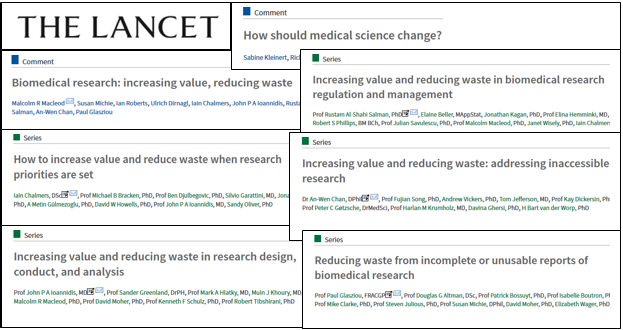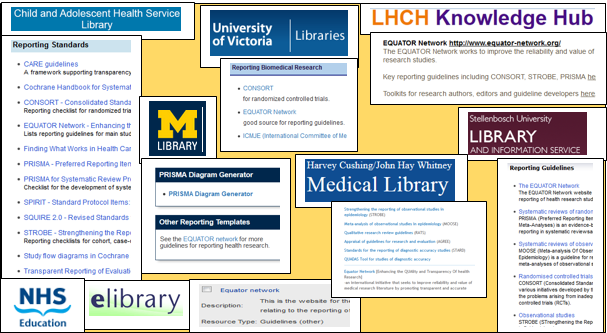Librarian Network
- Current issues regarding the quality and reproducibility of published biomedical research studies
- What can librarians do?
- Action plans for Librarians
- Examples of what libraries are currently doing
- Collaborate with us?
- Toolkit development plans
- General introductory resources
- Librarian Network
Current issues regarding the quality and reproducibility of published biomedical research studies
Librarians are excellently positioned to raise awareness of the importance of complete, accurate and transparent reporting of research studies amongst the clinicians and researchers with whom they work and the EQUATOR Network is keen to help support librarians with these activities.

There has been much discussion and concern in the medical literature recently about the quality and reproducibility of published biomedical research studies and what actions can be taken to address this global issue (please visit the Lancet Waste series and campaign and the REWARD Alliance web pages for more information). Librarians, through identification of new opportunities to provide additional research support, can play an important role in addressing these issues by working with clinicians and researchers to improve the quality of the research studies published by their organisations and institutions.

There are many ways that librarians can help to promote reporting guidelines and contribute to increasing value and reducing waste in biomedical research.
In direct response to the Lancet waste series, we at EQUATOR, wrote a blog post outlining some ideas [download a pdf of the blog post].
A recent blog post by JoVE also raised awareness of the role of librarians and highlighted resources from the EQUATOR Network designed to support librarians in helping to improve research reporting and reproducibility.
In a recent article, published in the European Health Information and Libraries Journal we also discuss identifying opportunities for biomedical librarians: “Impactful librarians: identifying opportunities to increase your impact” (PDF).
We have also tried to raise awareness of the contribution that biomedical librarians could make in working together with researchers, clinicians, journals and funding bodies to increase value and reduce waste in research in a comment article published in the Lancet in April 2016.
In May 2017, we presented at the MLA Research Reproducibility Symposium on the topic of ‘The essential role of librarians in addressing biomedical research reporting and reproducibility issues: a call to action’. The presentation slides are available at: Research Reproducibility Symposium 2017 (PDF).
In June 2017, in collaboration with colleagues, we delivered a workshop at the joint International Congress of Medical Librarianship (ICML) / European Association for Health Information and Libraries (EAHIL) conference in Dublin, Ireland on the topic of ‘Librarians can help address reporting concerns in the biomedical literature, particularly for systematic reviews’. All the slides and content from the workshop can be accessed at: ICML/EAHIL workshop 2017
What can librarians do?
If you would like to raise awareness about reporting guidelines amongst your library users through promotion, education or researcher support please see the list below for some ideas:
Promotion
- Include details about reporting guidelines in library bulletins
- Link to the EQUATOR Network website resources or to individual reporting guidelines from your library website pages
Education
- Include information about reporting guidelines in library induction sessions
- Hold research reporting workshops
Researcher support
- When supporting the work of clinicians and researchers mention relevant reporting guidelines and how to locate them
- When presenting the results of literature searches to researchers alert them to the appropriate reporting guideline for reporting their study
Action plans for Librarians
In May 2017 we launched two action plans with suggested actions that biomedical librarians could take locally within their library services to help to address international issues of research reporting and reproducibility.
- Librarian Action Plan: Simple Ideas
[download a PDF of the Librarian Action Plan: Simple Ideas]
This action plan highlights some simple and easy to implement ideas for librarians to try out in their libraries. - Librarian Action Plan: Targeted Actions
[download a PDF of the Librarian Action Plan: Targeted Actions]
This action plan promotes more in-depth targeted actions that librarians could take to directly respond to specific recommendations made in either the Lancet Waste Series or in the recent Manifesto for Reproducible Science.
Examples of what libraries are currently doing
Increasingly, biomedical librarians are recognising the importance of providing information and links to resources from their library web pages that promote reporting guidelines and support transparency and research reproducibility. The image below simply provides a snapshot of the numerous libraries around the world that currently do so.

Collaborate with us?
We are currently working with the Gerstein Science Information Centre at the University of Toronto on a project to help raise awareness of reporting and reproducibility issues during the systematic review process by helping researchers and clinicians to develop review protocols and use relevant reporting guidelines. Learn more about this collaboration.
If you would like to find out more about collaborating with us to help to improve research reporting and increase value and reduce waste in biomedical research then please contact: Shona Kirtley, shona.kirtley@csm.ox.ac.uk
We are very keen to work with biomedical librarians to help address these global issues.
Toolkit development plans
We are in the process of developing resources (documents, presentations, leaflets/posters, videos, e-learning etc.) specifically to help librarians and information specialists address international issues such as research waste and research reproducibility, promote reporting guidelines, hold research reporting workshops and provide the clinicians with whom they work with the relevant reporting guidelines for their research studies. Whilst we develop these we have brought together some useful general introductory resources for you to use and have included links to these below.
General introductory resources
Why librarians working in the health sector are excellently positioned to raise awareness about reporting guidelines and encourage their use through promotion, education and researcher support
- Embracing new roles: how librarians can encourage and support clinicians and health-related researchers to improve the quality of published research papers. Shona Kirtley. [View slides (PDF)] [View slides with Spanish translation (PDF)]
Why accurate, complete and transparent reporting is important
- The importance of clarity, transparency, and accuracy in research publications. Doug Altman. [View slides (PDF)]
- Transparency and accuracy in reporting health research. Doug Altman. [View slides (PDF)]
- Transparent reporting of health research is essential. Doug Altman. [View webinar]
EQUATOR Network resources
- Reporting guidelines and EQUATOR resources. Iveta Simera. [View slides (PDF)]
- Simera, I; Altman, DG. Reporting medical research. Int J Clin Pract. 2013;67(8):710-716. PMID 23656235 [Read the full-text paper]
- How to support EQUATOR [Visit webpage]
Librarian Network
We also intend to develop training resources specifically aimed at librarians/information specialists so that they can feel confident when including information about reporting guidelines in their induction sessions, when running reporting guideline workshops or simply when talking to clinicians about reporting their research. We aim to do this through establishing a free to join international librarian and information specialist network which will allow us to provide further practical support to librarians by providing librarian training, Q&A sessions, regular support webinars, an email discussion list, and an opportunity for librarians to share their experiences about raising awareness of research reporting guidelines and explore possible collaborations.
We plan to partner with other organisations to translate all materials to ensure that librarians/information specialists can deliver reporting guideline information and training sessions to clinicians and researchers in their local language.
We are very keen for biomedical librarians to get involved…please do consider:
- Volunteering to join our advisory group or become a country representative
- Contributing your ideas and experiences to our toolkit development and resources
- Suggesting ideas for other relevant activities that the Network could support or possible funding opportunities to support the development of our Librarian Network
- Simply join the Network and start raising awareness about reporting guidelines
Please email Shona Kirtley for more information or to sign up to the Librarian Network.
This page will be regularly updated to keep you up to date with all developments regarding the toolkit and Librarian Network.
Page last updated on 8 June 2021.
